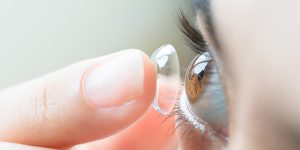1:30min

Image, Shutterstock
By Helen Carter
Journalist
Australian researchers will collaborate with Indian colleagues to investigate contact lenses as drug delivery systems to control, manage and treat various ocular diseases.
Academics from UNSW Sydney and Uka Tarsadia University in India formed the research partnership for drug delivery through contact lenses.
Medical microbiologist Professor Mark Willcox from UNSW’s School of Optometry and Vision Science was integral in establishing the partnership.
‘We are delighted that the collaboration between UNSW and Uka Tarsadia University has been formalised and look forward to working together on research to develop therapeutic contact lenses that can help people in India, Australia and the world,’ Professor Willcox said.

Professor Mark Willcox
‘Ocular diseases are usually treated using eye drops, but unfortunately these often do not deliver enough drug or have the drug resident on the eye for long enough.
‘Using contact lenses to deliver the drugs can overcome these problems and they may be used to treat diseases such as glaucoma, dry eyes, conjunctivitis, myopia development and macular degeneration.’
The partnership involves staff and students from both universities going on exchange to work on the project.
Optometrist and senior lecturer at UNSW’s School of Optometry and Vision Science Dr Alex Hui said: ‘The partnership will allow for complementary collaborations between optometrists, engineers, pharmacists and chemists.
‘It comes at a critical time where research interest in managing diseases such as dry eye and myopia development is increasing both from clinicians and patients.’
Dr Hui’s work centres around the development and testing of novel ways of treating ocular diseases. He has focussed on using contact lenses to deliver pharmaceuticals to the eye, including delivery of antibiotics, anti-allergy and anti-inflammatory agents.

Dr Alex Hui
Under the collaboration, academics will participate in research, co-supervise postgraduate students and give lectures and tutorials in the research area and students will be able to work alongside basic and clinical scientists in emerging areas of research in contact lenses, drug delivery and the ocular surface.
Dr Furqan Maulvi from Uka Tarsadia University’s Maliba Pharmacy College has published several key papers on contact lenses and drug delivery.
‘I am excited and look forward to working with the team at UNSW to develop novel therapeutic contact lenses to treat various anterior and posterior eye diseases,’ Dr Maulvi said.
Uka Tarsadia is a private university and the affiliated Maliba Pharmacy College is the centre of collaboration with UNSW.
‘Smart clinical contact lenses’ are mentioned in Optometry Australia’s Optometry 2040 project in the preferred future pathway for optometrists and eye care patients.
Optometry 2040 aims to identify likely and preferred futures for optometry, optometrists, and community eye health, and it says the preferred future scenario for optometrists and eye care in Australia sees the growth of ‘partici-patients,’ prompting a role transformation across health care and pushing clinicians towards ‘knowledge translators.’ In this scenario, optometrists become the trusted guide through the eye care system.
The report says this is supported through collaborative professional-patient relationships facilitated by technologies such as app-based disease monitoring, wearable technology providing continual monitoring on key health indicators and ‘smart’ clinical contact lenses.
Tagged as: AMD, Contact lenses, Dry eye, Future, International, Patient management, Scope of practice, Universities